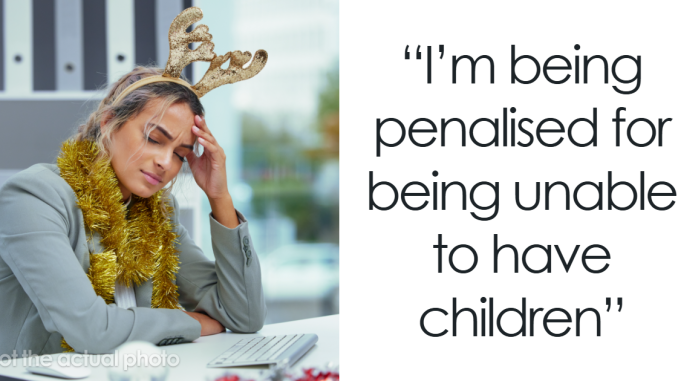
Many of us have had to work over the holidays at some point in our careers. Depending on your industry, company, and workplace culture, you’re either kicking back and relaxing over Xmas or it’s just a regular work week for you, albeit one with higher pay, tasty food, and cozy decor… hopefully. However, one thing that grinds people’s gears is workplace inequality.
If a handful of your colleagues get special treatment, this will lead to a lot of resentment and tension. One anonymous woman went viral on Mumsnet after venting about how she’s forced to work long hours on Christmas week while those of her colleagues who have children get to take off early. You don’t have to have kids to want to spend the holidays with the people you love instead of at the office. And discrimination has no place in any workplace. It’s also illegal. Scroll down for the full story, as well as how various internet users interpreted the situation.
It’s natural to want to rest over the holidays. In some cases, employees are pressured to work when they’d rather be with their loved ones
Image credits: YuriArcursPeopleimages / envato (not the actual photo)
A British worker shared she’s forced to work over Xmas while her colleagues get to finish earlier because they have kids
Image credits: wosunan / envato (not the actual photo)
Image credits: boogiewoogie24
Discrimination at work, in education, and elsewhere is outright illegal in the UK
Labor laws in the West are fairly solid when it comes to fighting back against discrimination. The law is very clear.
According to the British government, in the United Kingdom, where the author of the viral post works and lives, it is against the law to discriminate against anyone because of:
age
gender reassignment
being married or in a civil partnership
being pregnant or on maternity leave
disability
race including color, nationality, ethnic or national origin
religion or belief
sex
sexual orientation
These are all so-called protected characteristics and they protect people at work, in education, as consumers, when using public services, when buying or renting property, and as members or guests of private clubs or associations.
You aren’t powerless; there are different things you can do if you think that you’ve been unfairly discriminated against. For example, you can complain directly to the person or organization (e.g., your manager, HR department, or whoever is at the top of the corporate ladder).
Be sure to read your work contract in detail, get to know your local labor laws, and consider talking to a legal representative for advice
Alternatively, you can look for mediators. For instance, you could talk to your trade (labor) union representative or seek out a solicitor’s advice. If things don’t improve, you always have the option of going to court.
No matter the trouble at work, it’s always helpful to take a close(r) look at your contract, your company’s policies, and the local and national labor laws. If your contract specifies that your manager can ask you to work over the holidays, you should also make sure under what conditions you’re allowed to say ‘no.’
Of course, what happens ‘on paper’ and behind closed doors at businesses can be very different. Even companies that claim to treat all of their employees equally can play favorites. But if that information gets out to the wider public, the company can land in hot water and end up damaging its reputation, as well as its profits.
That’s not to say that every company is going to be mustache-twirlingly ‘evil’ or anything like that, but it takes constant work for a culture of transparency, responsibility, and support to remain strong. And every employee is a part of that culture. If one person plays favorites or discriminates against their colleagues who (don’t) have children, it’s a big step toward toxicity. There are many business practices that are outright illegal.
If you want the holidays off, you need to bring the topic up with your superiors. Being told that you’ll be working because ‘you don’t have kids’ isn’t an excuse. It’s not valid and it’s grounds for a chat with your lawyer.
How would you handle this situation if you were in the woman’s shoes, dear Pandas? Have you ever had to work the holidays while people with kids get an easy pass? Or maybe you’ve experienced the reverse where you have children and you’ve been discriminated against in the workplace? When was the last time you had to work over Xmas? Feel free to share your thoughts in the comments. Happy holidays!
Many people were shocked by this sort of toxic behavior at work. Here’s their perspective
The post Woman Can’t Have Children, Gets Penalized By Being Forced To Work The Holidays first appeared on Bored Panda.
